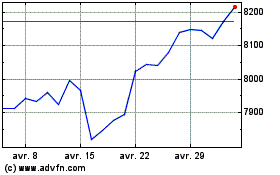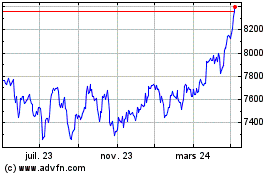UK Economy Slowed in 2018 as Brexit Uncertainty Hindered Investment
11 Février 2019 - 11:25AM
Dow Jones News
By Paul Hannon
The U.K. economy slowed last year as businesses slashed
investment in the face of growing uncertainty about the way in
which the country will leave the European Union.
The U.K. is scheduled to leave the bloc on March 29, but it's
still not clear whether it will have a transition period that
maintains the status quo while a new trade agreement is negotiated
or will immediately shift to a new regime of tariffs dictated by
World Trade Organization rules.
In the latter case, the Bank of England has warned the economy
could fall into recession. But even where there is a transition
period, uncertainty about the future relationship is likely to
persist as trade talks progress, potentially holding back growth
into 2020.
The Office for National Statistics Monday said the U.K.'s gross
domestic product--the broadest measure of goods and services
produced in the economy--was 1.4% higher in 2018 than in 2017, the
weakest expansion since 2012. The economy slowed more sharply as
the year drew to a close, with GDP rising at an annualized pace of
0.7% in the three months through December, down from 2.5% in the
third quarter. In December alone, GDP fell by 0.4% from the
previous month.
Falling investment was largely responsible for the 2018 slowdown
and was down 0.9% from the previous year, which was the largest
drop since 2009, when the UK economy was caught up in the global
recession that accompanied a major financial crisis.
Write to Paul Hannon at paul.hannon@wsj.com.
(END) Dow Jones Newswires
February 11, 2019 05:10 ET (10:10 GMT)
Copyright (c) 2019 Dow Jones & Company, Inc.
FTSE 100 (FTSE:UKX)
Graphique Historique de l'Index
De Mar 2024 à Avr 2024

FTSE 100 (FTSE:UKX)
Graphique Historique de l'Index
De Avr 2023 à Avr 2024
